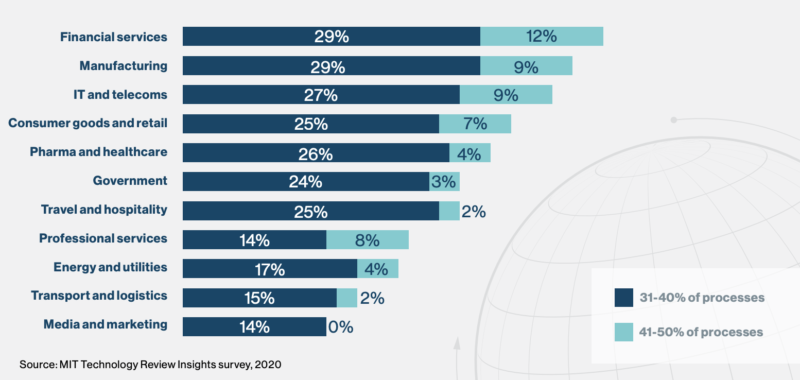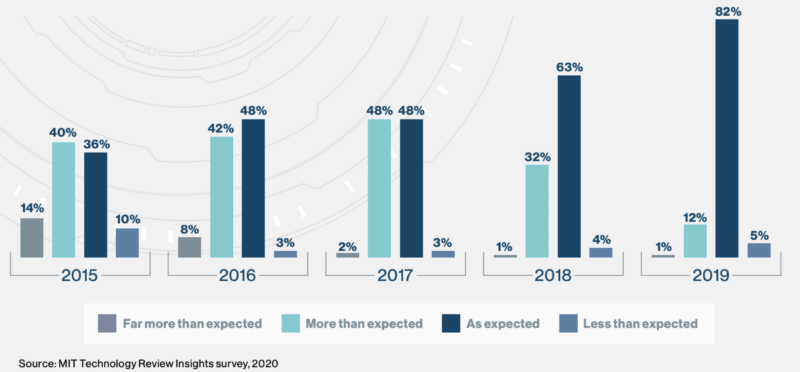Large majority of recent AI deployments meeting expectations, says MIT survey
Nearly all "large companies" in the survey will be using AI by the end of this year.
A majority of large corporations surveyed by MIT Technology Review Insights have deployed AI technologies in their organizations — some with mixed results. The survey of “1,000 executive across 11 different sectors” and five continents was conducted earlier this year (pre-coronavirus).
The sectors surveyed. The 11 verticals were: manufacturing, IT and telecomm, consumer goods and retail, financial services, pharma and healthcare, professional services, energy and utilities, transport and logistics, travel and hospitality, media and marketing, and government.
In three years, approximately what percentage of your business processes will use AI?

The survey found that by the end of this year, coronavirus notwithstanding, 97% of the “large companies” surveyed will have deployed AI technology. The top uses were quality control, customer care and fraud detection. However, there were many others beyond those, including inventory management, asset maintenance, personalization, pricing and cybersecurity.
Late adopters saw more consistent performance. The survey found early adopters were more likely to report high satisfaction levels as well as disappointment with AI. “Surveyed organizations that first deployed in 2015 are more likely than those deploying later to have seen their AI project underperform in terms of return on investment (ROI). But the early adopters are also more likely than others to say that ROI has exceeded expectations.”
Later adopters overwhelmingly reported that AI deployments were in line with performance expectations. This probably also reflects improvements in the technology and the closing of the gap between sales hype and real-world performance. In other words, many of these tools now do what they claim to be able to do.
Extent to which AI has delivered returns on investments, by
year of first deployment

Barriers to full utilization. The survey identified a range of challenges to full adoption and exploitation of AI within organizations. In order, those were the following:
- Business or process challenges of using AI insights
- Data quantity, quality or availability
- Shortage of internal data scientists or AI developers
- Difficult to build a business case
- Regulatory or security concerns
- High cost of technology
- Lack of senior management understanding of AI
Two-thirds want to share data. Interestingly, and perhaps contrary to major data privacy trends in North America and Europe, 66% of survey respondents expressed a willingness or desire to share internal data for the purpose of developing new products, services or processes. Indeed, the number two constraint to full utilization of AI identified in the survey was “data quantity, quality or availability.” Hence the interest in data sharing.
However, privacy rules and regulatory uncertainty are the top barriers to data sharing among large enterprises, the survey found.
Ethics is also another major issue for AI and organizations using it. Algorithmic bias and accountability are mostly unresolved issues that will need to be addressed as AI applications become commonplace across industries.
Why we care. Machine learning and AI have moved way beyond the early hype stages, when every product announcement contained the term “AI” to dazzle journalists and investors. While perhaps not fully mainstream, organizations are now dealing with much more practical and operational issues in trying to implement and scale AI tools and AI-driven processes.
The survey results discuss digital marketing only in passing. However, the survey did find that “media and marketing firms are three times more likely than the rest to say that ROI has failed to meet expectations” — that is: express disappointment.
That disappointment may partly be a failure of marketers to fully understand how to work with and fully utilize machine learning and AI. To remedy that, for example, WPP said it intended to train 50,000 employees in AI and accredit 5,000 data scientists and engineers in the next two years.
Opinions expressed in this article are those of the guest author and not necessarily MarTech. Staff authors are listed here.
Related stories
